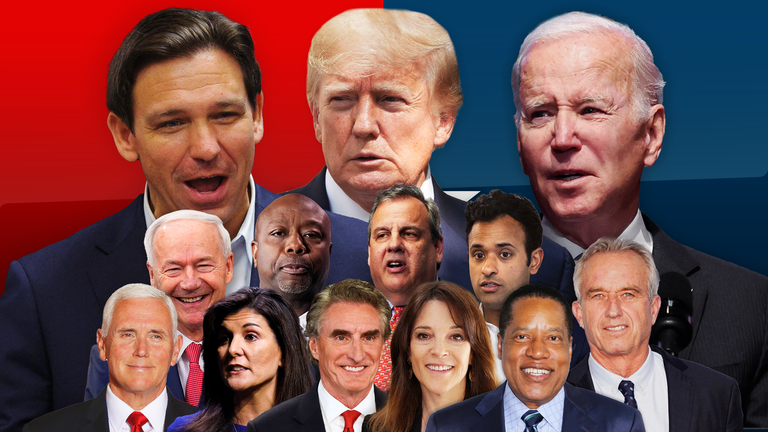As the new year unfolds, the 2024 presidential election emerges as a focal point, with impactful legal battles, clashes in early primary states and progressive policies reshaping the race. With this significant election on the horizon, staying informed is crucial for the class of 2024 as they prepare to participate in the electoral process for the first time. With the primary season coming to an end, the 2024 presidential candidates are entering a high-stakes general election phase whose outcome depends on key events that have taken place and uncertainties that are yet to unfold.
14th Amendment in Focus: Potential Impact on Trump’s Candidacy
In a legal battle that could significantly alter the 2024 presidential landscape, former president Donald Trump’s potential candidacy is facing a critical challenge rooted from the 14th Amendment. Section three of this amendment, prohibiting individuals involved in “insurrection or rebellion” from holding federal office, is currently under evaluation, particularly in light of Trump’s alleged role in the January 6, 2021 Capitol attack.
Colorado courts, pointing out Trump’s alleged role in inciting the Capitol attack, have removed him from the state’s presidential ballots. The upcoming Supreme Court hearing on February 8 is a crucial moment, questioning the constitutionality of Trump’s Colorado ballot disqualification and its potential impact on his eligibility to run on national ballots. A few states like Colorado and Maine have already removed Trump from their ballots and several other states are attempting to do the same.
“States generally get to decide the qualifications for their candidates and whatnot,” AP Government teacher Steven Moran explained. “However, trying to use one part of a national applicable amendment to try to limit the candidacy of somebody is going to be a problem, which is why the appeals are going on.”
Iowa Chooses First: Who Wins the Early Vote?
On January 15, Trump emerged victorious in the Iowa caucus, the first nominating contest of the 2024 election cycle.
The Iowa caucus is a unique process where voters in Iowa come together at local meeting places to openly show their support for a presidential candidate. Unlike a regular secret ballot vote, the caucus involves a process where participants openly declare their support for their preferred candidate, have opportunities to convince others to join their group and may change their alignment to support a different contender during the event.
“The only reason Iowa is important is because it’s first,” Moran said. “So if something unexpected happens, like somebody does better than one would have thought or somebody does worse than one would have thought, that has implications for people in the rest of the timeframe.”
Numbers Game: Does a Bigger Republican Field Mean a Weaker Hand?
The 2024 presidential primary features a substantially larger field of candidates compared to the Democrats. On the GOP side, contenders currently include former President Donald Trump and former UN ambassador Nikki Haley. Previous candidates include former Vice President Mike Pence, entrepreneur Vivek Ramaswamy and Florida Governor Ron Desantis.
The Democrats, on the other hand, currently have had just three declared candidates – incumbent President Joe Biden, author Marianne Williamson and Congressman Dean Phillips.
The substantial number of Republican candidates, starting with 13 initially, is over five times that of Democrats, prompting questions about party dynamics. Some interpret the large number of Republican candidates as a signal that the GOP, in the post-Trump era, is facing internal divisions while a smaller Democratic roster suggests unity.
Biden Faces Challenges: Approval Ratings Slide in Election Year
As November draws closer, President Joe Biden faces declining approval rates that could hamper his re-election chances. When Biden first took office in January 2021, his approval rating stood at 53.4% while his disapproval rating was 30%, according to FiveThirtyEight polling averages. But as of January 2024, Biden’s approval rating has slid to 38% while his disapproval has climbed to over 56%. The nearly 20 point drop in his net approval over three years represents a significant challenge as Biden seeks a second term.
“I think Biden did absolutely nothing during his term,” Lambert senior Janice Rho said.
With a handful of Americans now disapproving of his job performance, Biden will need to take steps to reverse this slide and regain positive perceptions among voters in the months leading up to the election.
Wild Card Race: Anything Goes without Trump
If Trump is removed from the primary ballots, the 2024 race could become even more unpredictable. The absence of a clear front runner, according to polls, could lead to intense competition amongst contenders like Joe Biden and Nikki Haley, but it also opens the possibility for unexpected candidates to gain traction.
“I think Desantis or Haley would have a chance because they’re right behind on the polls,” Rho said.
Your Vote, Your Future: A Senior’s Guide to Navigating the 2024 Election
The 2024 election offers seniors at Lambert High School the opportunity to exercise their right to vote for the first time. To participate, students must register through Georgia’s online voter registration system at least 30 days prior to election day in November.
Staying engaged with campaign coverage, policy debates and candidate positions can enable informed decision making amongst students. It’s also important for them to establish which issues are important to them as young voters. The most important issues to Rho, for example, are climate change and abortion.
Moran advises students to stay away from Tiktok and Instagram, as these social platforms are prone to spreading misinformation. Getting involved in the election process will allow first-time voters to make their voices heard on the issues that matter most to their generation.















